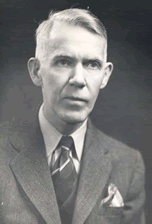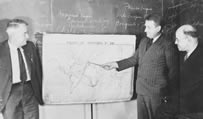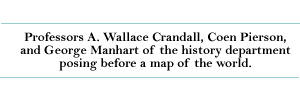
<<
Back
Four
men dominated the DePauw history department from the post World
War I years through the first decades after World War II. Two Europeanists
and two Americanists, diverse in temperament and interests and rivals
in popularity, they worked together harmoniously enough to create
a strong history program.
The first to join the DePauw faculty was William Wallace Carson,
a North Carolinian with a B.A. from Wofford and M.A. from Trinity
in his home state and a Ph.D. from the University of Wisconsin.
He was appointed instructor in history and political science in
1916. The longtime head of both departments, Carson combined his
teaching with various administrative responsibilities, including
membership in the university senate in the Oxnam years and the post
of university marshal, stage-managing commencements and other public
occasions.
 
In his popular course on the American west he elaborated on the
frontier thesis of Frederick J. Turner; his lectures on steamboating
on the western waters were long remembered by students. The tall,
courtly southern gentleman and his wife, Louella, were frequent
chaperones at fraternity and sorority dances. His deafness made
him appear prematurely old, but he remained a vigorous teacher until
his retirement in 1953. He was a familiar figure on his walks about
Greencastle until his death in 1967.
George Born Manhart came to DePauw in 1919 straight from civilian
war service in army camps in Texas and Arkansas. A graduate of Susquehanna
College with an M.A. and Ph.D. from the University of Pennsylvania,
Manhart was a Wilsonian idealist with fervent faith in the League
of Nations. He taught modern European history in the conviction
that rational men might find a way to prevent world conflict by
studying the causes of the two great wars of the 20th century. The
most scholarly and demanding of the quartet, he encouraged many
students to take up graduate studies and enter the teaching profession.
He was active in the honors program and the major proponent of general
education in the university, introducing and leading the teaching
of the popular History of Civilization course.
A socialist and pacifist in the 1930s, he enlisted in the Air Force
in 1943 at the age of 53, leaving the service as a captain in 1945.
After official retirement in 1956, he kept busy with part-time teaching
and the research and writing of the two-volume DePauw Through
the
Years to mark the university's 125th anniversary. He died in Greencastle
in 1970, not long after the death of his wife, Florence Heritage Manhart, who had been an instructor in physical education at DePauw.

Andrew Wallace Crandall was a "son of the middle border,"
who came to DePauw in 1921 with a B.A. from Central College and
M.A. from the University of Chicago. An officer in Europe during
World War I, he remained in the Army Reserve for the rest of his
life and served overseas as a member of the office of military history
in World War II, retiring with the rank of major. He earned a Ph.D.
at Pennsylvania with a dissertation published under the title Early
History of the Republican Party, reprinted in 1960.
A folksy lecturer - "Don't monkey with the tariff or you'll
cause hard times" - A.W., as he was generally known, captivated
his students with his stories and anecdotes. His annual lecture
on the battle of Gettysburg became a DePauw legend. He retired in
1960 but continued to teach as the Pulliam Professor of American
History until his death three years later. He is survived by his
wife, Marion Bradford Crandall, who had been DePauw's first full-time
registrar and later an instructor in secretarial science.
Coen Gallatin Pierson, one of the first Rector scholars at DePauw,
returned to his alma mater as an instructor in history in 1926.
Holder of the M.A. from the University of Illinois and the Ph.D.
from the University of Wisconsin, he specialized in British history;
pre-law students flocked to his course in English Constitutional
History. An ardent Anglophile, Pierson was an exchange professor
at Exeter University in 1954 and frequently visited Britain with
his wife, Viva Bolin Pierson, who earned two degrees from DePauw.
A British publisher issued his Canada and the Privy Council in 1960.
Pierson was active in promoting honors work and the general studies
program and helped to institute the program in African Studies.
After retirement in 1966 he taught briefly at Illinois State University
and died in 1972. His tombstone in Greencastle is in the appropriate
form of a Celtic Cross.
Back
to Top
<<
Back
|





